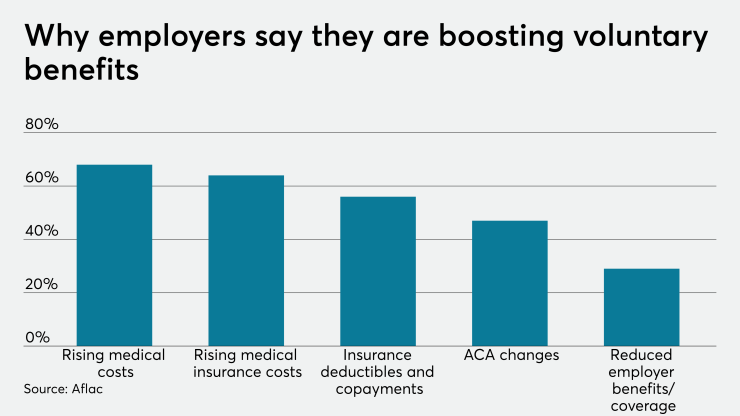Employees have high expectations when it comes to the benefits they want their employer to provide during COVID-19. Employers who fail to upgrade offerings may find themselves stuck with high turnover rates and a weak talent pipeline.
Voya Financial, a retirement, investment and insurance company, reported a 5.7% year-over-year increase in annualized in-force premiums for its employee benefits business, which was driven largely by strong demand for its voluntary benefit offerings including life and disability coverage, as well as critical illness and hospital indemnity plans.
These results aligned with company expectations, as more employees continue to turn to their employers for help with their health and financial wellness needs.
“Year over year we’ve had more than 20% growth in voluntary products,” says Rob Grubka, the president of Voya employee benefits. “That's a pretty consistent thing that's happened over a number of years for us. A big part of that is [the growing] coverage needs that employees have.”
Read More:
As employees struggle to balance their work and home lives in a remote world, they want their employer to support them more than ever. If they can’t get that support from one employer, they’ll look elsewhere.
Employees are willing to sacrifice potential job opportunities and even their compensation for better perks: 62.3% of the employees surveyed by Staples said they would accept a lower salary in exchange for better benefits, while just 37.7% said they prefer the higher pay. Furthermore, 80% of employees surveyed by the American Institute of Certified Public Accountants said they would choose a job with benefits over a competing offer with a higher salary, but no benefits.
The COVID-19 pandemic has highlighted the need for these and other employee benefits that take care of the whole individual, rather than focusing on one aspect of their lives.
Read More:
In a recent interview, Grubka discussed the need for employers to invest holistically in their employees’ well-being and how COVID-19 has spurred employees to pay closer attention to the benefits choices they make.
How can employers help workers navigate benefits choices around healthcare, especially during COVID?
There's more and more solutions that are available to employees, but it doesn't imply that there's more understanding of those solutions.
[For example], if you’ve got an accident product, critical illness or hospital indemnity product, those three things together are a really powerful package. So employers want their people to better understand it and know how to make decisions.
There's all these different situations and all these benefits that are available that employees need help to make decisions around. But they’ve thrown so many of them at their employees — it becomes about helping them navigate through that.
That is a better way to help employees think about their planning in both the short-term and long-term. Retirement feels like this very nebulous thing, but medical decisions are right here, right now, and they have an impact today. That's the conversation we're trying to better influence and better guide people through.
How has COVID-19 showcased that employers need to play a more holistic role in their employees’ lives?
COVID has put the spotlight on it and increased the intensity. It's only going to intensify both the opportunity and the challenges for employers of how we communicate this and do it in an effective way and make sure people actually understand how we are different. That's going to occupy more of the selling process to the employee of why [any company] is the right place for you to be at work.






